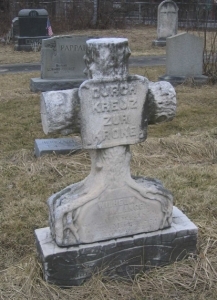 (Host)
(Host)
It’s Memorial Day, which many Americans celebrate as a three-day
weekend, while others commemorate the sacrifices that gave it its name.
Commentator Willem Lange is a writer and storyteller who thinks that too
many of us may be forgetting what this day encourages us to remember.
(Lange)
Decoration Day, we called it back in the 1930s. On the 30th of May, whatever day of the week it was, my grandfather closed his pharmacy, and
we all piled into his Chevy to visit our ancestors’ graves and leave
flowers on them. Stolid old Germans they were, whose monument bore the
legend, Durch Kreuz zur Krone – "Through the Cross to the Crown."
Suffering was more popular in  those days as a qualification for Heaven.
those days as a qualification for Heaven.
There’s
no agreement when and how Memorial Day began; everybody wants to claim
it – rather like the hundreds of old inns advertising that George
Washington slept there. Spring picnics in family graveyards were a
tradition in the South before the Civil War.
Probably the first
memorial was performed by a group of freed slaves who landscaped a mass
burial site of Union soldiers in Charleston, South Carolina, where the
war had begun. They built an enclosure, and on May 1, 1865, laid flowers
on the graves to commemorate the sacrifices.
During the war,
Southern women decorated the graves of Confederate dead. After
Appomatox, the Lost Cause Movement and the Ladies’ Memorial Association
established Jefferson Davis’ birthday, June 3, as the Confederate
Memorial Day. By 1900 its emphasis had shifted from honoring the dead to
glorifying the Confederate cause.
Meanwhile, General John
Logan, Commander of the Grand Army of the Republic, proclaimed a
national Decoration Day for May 30 – not a date of any Civil War Battle.
And so it remained, more or less; there were still other dates
celebrated in the South, and for decades disagreement about the proper
day for it – even though the original one was picked out of the air.
In
1968 Congress passed the Uniform Holidays Bill, which designated the
last Monday in May Memorial Day. This made it part of a three-day
weekend – to most Americans a holiday, rather than a day of solemn
remembrance, which understandably upsets the members of veterans’
organizations, who sponsor parades and cemetery services with
appropriate salutes.
Those of us who remember the rationing and
air raids of our youth, and lost friends or family members in what we
call "The War," may regret that less attention is paid now to the
sacrifices of our service-people. We pause to honor them today. There
was no question of the importance of their cause. But I also pray that
our nation, besides honoring its dead, will seek greater clarity of
purpose before sending more thousands of our young people to fight and
die for reasons less compelling. We owe that to them – and to our
honored dead – as well.